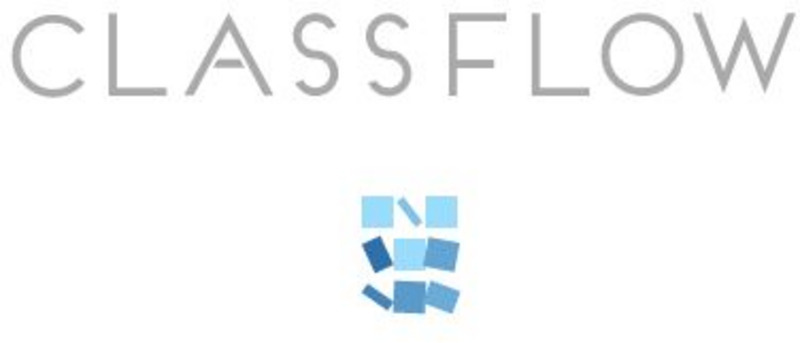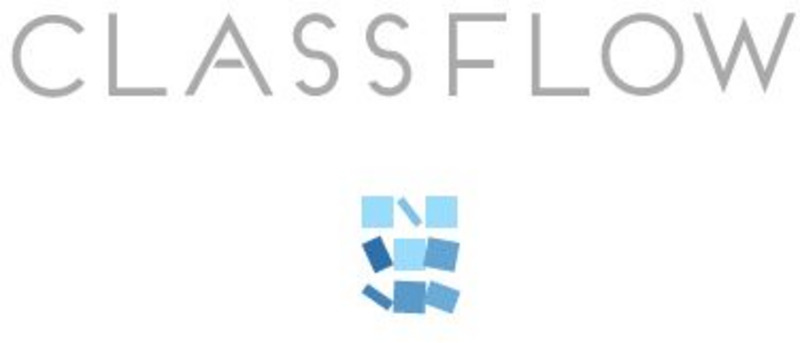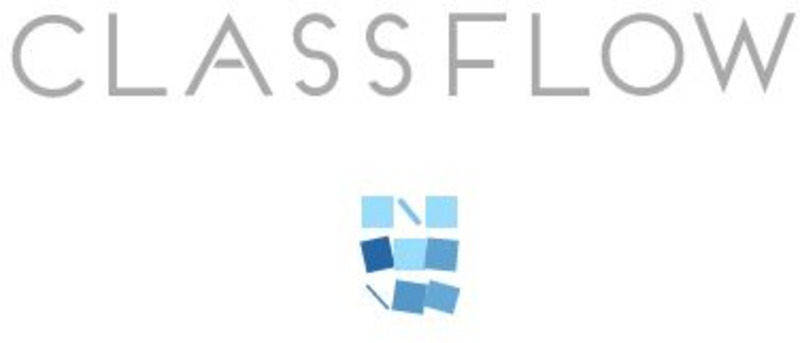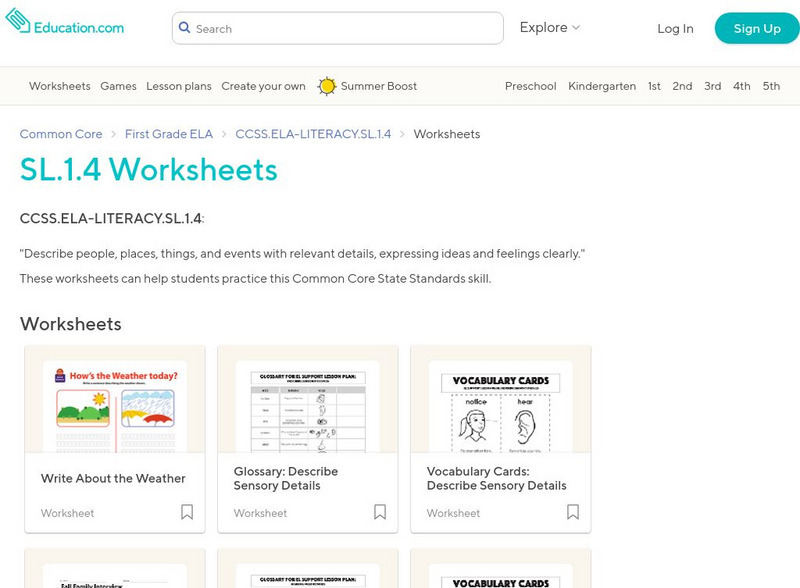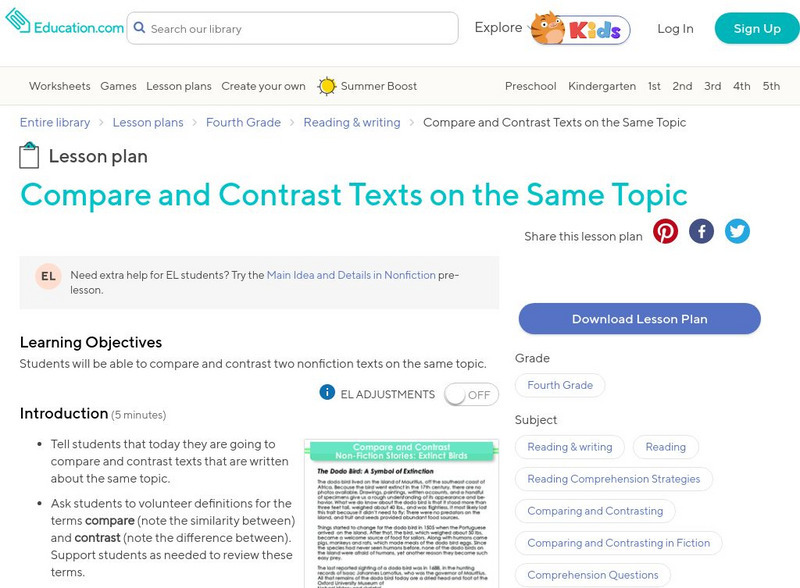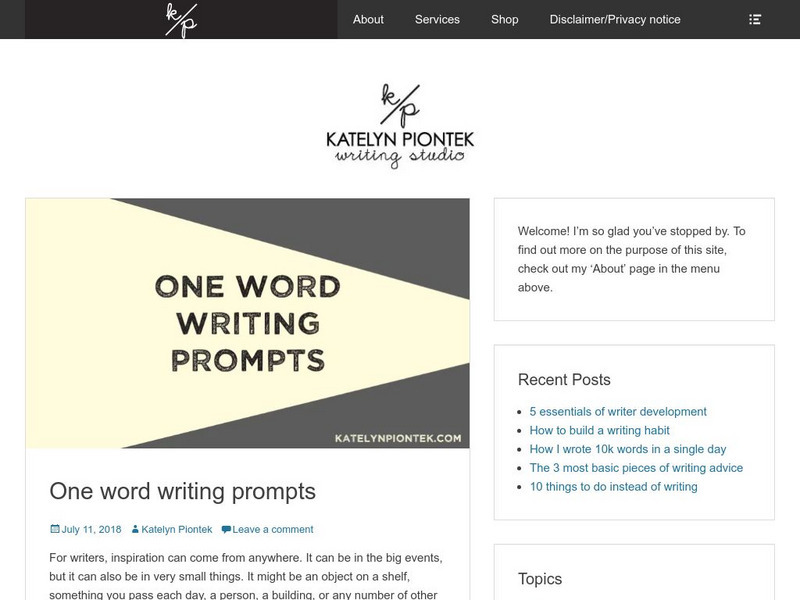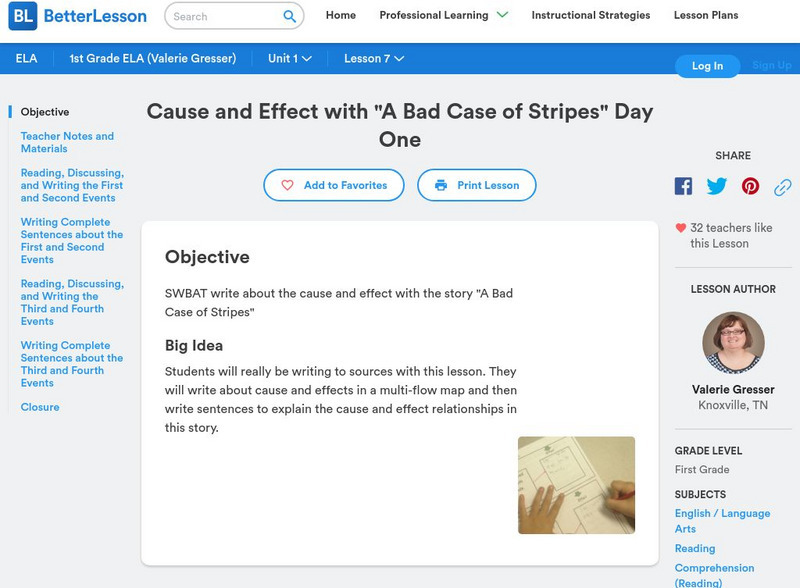Florida Center for Reading Research
Florida Center for Reading Research: Monitor for Understanding: Sum Summary! [Pdf]
A lesson plan in which students read a narrative or informational text and complete graphic organizers to help them write good summaries of the texts. Materials are included.
Florida Center for Reading Research
Florida Center for Reading Research: Expository Text Structure: Summarizing [Pdf]
A lesson plan in which students read a text and record the main ideas and supporting details on a graphic organizer. Students then complete the organizer by writing a summary of the text. Materials are included.
Education.com
Education.com: Purposeful Writing: Kindergarten
[Free Registration/Login Required] Your kindergarten students will learn how to share their opinion with others through entertaining and purposeful persuasive writing practice. At the completion of this lesson plan, students will be able...
Scholastic
Scholastic Instructor: Puzzled Over Paragraphs?
Here is an excellent list of ideas for teachers to utilize in their classroom to accompany paragraph writing skills. These creative and exciting activities will sharpen your student's writing abilities.
Better Lesson
Better Lesson: Friendly Controversy
How do I convince others to understand my side of the story? Second grade students conducted shared research activities and participated in a Socratic Seminar practicing the techniques of persuasive reasoning.
Better Lesson
Better Lesson: It's a Process. Day 1 of 5
SWBAT collaborate in writing step by step directions for writing an informational paragraph.
Writing Fix
Writing Fix: A Word Game for Kids: The Memory Game for Kids
Young writers brainstorm three sensory details about a personal memory before writing about it. If they need help with a memory, they can click the magic button to help spark their memory. Their writing should include sensory details.
Writing Fix
Writing Fix:a Right Brained Writing Prompt: Serendipitous Alliteration: Letter S
Students use the alliteration generator to spark an idea for an alliterative narrative using the letter "S" and focusing on word choice and playing with words. An online page and a word choice checklist are provided for students to type...
Writing Fix
Writing Fix: A 6 Trait Writing Lesson: Emotional Recipe Write Ups
The writer studies the format of well-written recipes, paying particular attention to the type of verbs used in the paragraph of instructions which always follow the list of needed ingredients. Next, the writer thinks up a story or...
FableVision
Fable Vision: Peter Reynolds: The North Star: Writing Activity
Be inspired to write your own simple story or poem by choosing a picture from this collection of child-centered illustrations.
Education Place
Houghton Mifflin: Eduplace: 5 Ws Chart [Pdf]
This site from Houghton Mifflin Company provides a simple, reproducible chart to help students gather details of Who, What, When, Where, and Why. This could be used as a reading comprehension tool, or as prewriting for expository writing.
ClassFlow
Class Flow: Paragraphs
[Free Registration/Login Required] Students will write simple, non-chronological reports from known information (e.g., from own experience or from existing text), using notes made to organize and present ideas. Students will learn to...
Literacy Head
Literacyhead: Images to Give Writers Ideas: School
A collection of images of school to use as writing prompts. Students can make text-to-self connections, write creative stories, or just write about how the students in the images might feel.
ClassFlow
Class Flow: Paragraphs
[Free Registration/Login Required] Students will begin to organize stories into paragraphs, and use paragraphs in presentation of dialogue in stories. Reviews what a paragraph is and uses Humpty Dumpty as an example.
ClassFlow
Class Flow: Writing a Story
[Free Registration/Login Required] This flipchart explores the steps for writing a story such as coming up with a title, a main idea and supporting details that keep the reader interested.
Other
Tsl Books: Farm Questions and Statements [Pdf]
Students write two statements and two questions about the farm picture they see. They may color the picture after they have written the sentences.
ClassFlow
Class Flow: Building Creative Writing
[Free Registration/Login Required] This simple activity will enhance the descriptive writing of primary aged children. By building upon each page of the flipchart over a period of several days, it makes the students more aware of nouns,...
Education.com
Education.com: w.k.3 Worksheets
[Free Registration/Login Required] Choose from a variety of worksheets to reinforce the skill of writing to narrate a single event or several loosely linked events, tell about the events in the order in which they occurred, and provide a...
Education.com
Education.com: w.k.2 Worksheets
[Free Registration/Login Required] Choose from a variety of worksheets to help students practice writing to compose informative/explanatory texts.
Education.com
Education.com: Sl.1.4 Worksheets
[Free Registration/Login Required] Choose from a variety of worksheets to reinforce the common core standard of describing people, places, things, and events with relevant details, expressing ideas and feelings clearly.
Education.com
Education.com: L.1.1.j Worksheets
[Free Registration/Login Required] In first grade, students are taught to independently write different types of sentences. These types include declarative (a statement of fact or opinion), interrogative (a question), imperative (a...
Education.com
Education.com: Compare and Contrast Texts on the Same Topic
[Free Registration/Login Required] Explain that even if two texts are written about the same topic, they can have different information depending on the author's perspective or the source of the information. When we compare two texts on...
Other
Katelyn Pointek: One Word Writing Prompts
This site offers a list of one word writing prompts perfect for free writing activities which can be used as quick write or developed into stories. With one word story prompts, you start with the word provided and use either one sentence...
Better Lesson
Better Lesson: Cause and Effect With "A Bad Case of Stripes" Day One
Students will really be writing to sources with this lesson. They will write about cause and effects in a multi-flow map and then write sentences to explain the cause and effect relationships in this story.


![Florida Center for Reading Research: Monitor for Understanding: Sum Summary! [Pdf] Lesson Plan Florida Center for Reading Research: Monitor for Understanding: Sum Summary! [Pdf] Lesson Plan](https://content.lessonplanet.com/knovation/original/509088-9fceb7ddd10dab1b4fb2d2cdfe6dce64.jpg?1661786991)
![Florida Center for Reading Research: Expository Text Structure: Summarizing [Pdf] Lesson Plan Florida Center for Reading Research: Expository Text Structure: Summarizing [Pdf] Lesson Plan](https://content.lessonplanet.com/knovation/original/509106-80e78b7399a2808435954652f1b4d966.jpg?1661786965)






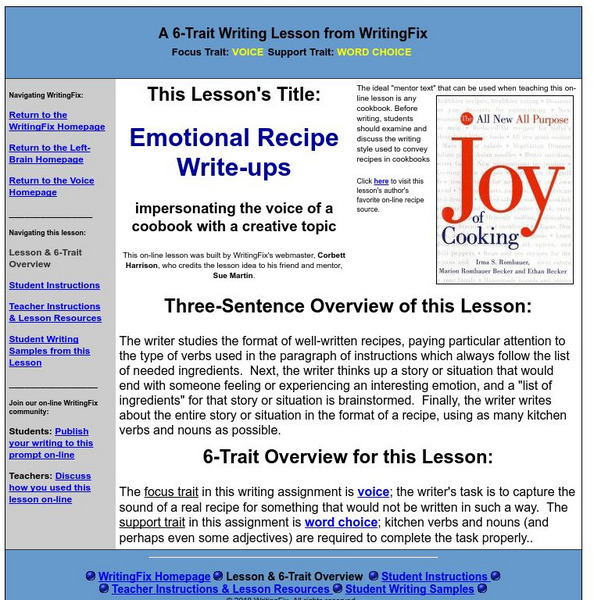
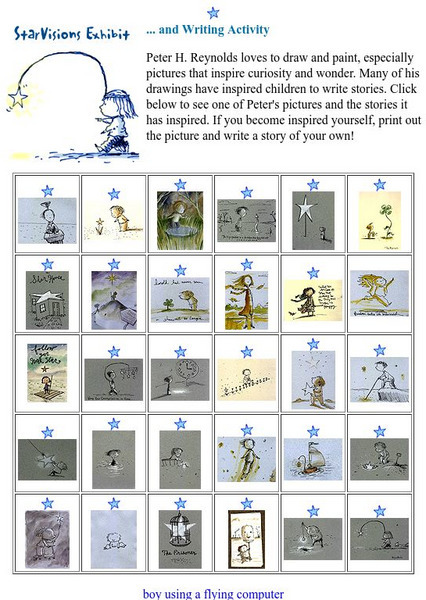
![Houghton Mifflin: Eduplace: 5 Ws Chart [Pdf] Graphic Houghton Mifflin: Eduplace: 5 Ws Chart [Pdf] Graphic](https://d15y2dacu3jp90.cloudfront.net/images/attachment_defaults/resource/large/FPO-knovation.png)


